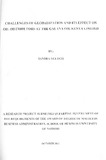| dc.description.abstract | This study set out to determine the challenges faced by firms in the Kenyan Oil industry that are as a result of globalization. It also sought to determine if the price controls imposed by the Kenyan Government on Oil Marketing Companies would be realistic in the long run. The study employed a case study approach. The target population included five senior managers of Galana Oil Kenya Limited. Primary data was collected by way of interviews with respondents. Of the target population, 4 interviews were successfully carried out, representing an 80% response rate. Data analysis was started immediately after the fieldwork. Data was summarized into frequencies and percentages and presented in bar graphs and tables.
The study found that the challenges faced by marketers included compliance with global regulations as opposed to national regulations which ultimately led to loss of revenue, fines and peMlties being imposed on them and changes in the political and fiscal regimes in which they traded meaning that carefully laid out strategies would have to be re-thought and re-analyzed. The study findings also pointed to. the fact that price controls imposed on Oil Marketing Companies were not realistic in the long term mainly because the oil industry is a volatile market whose prices are affected by various factors both internationally and locally. Since the price of oil is heavily dependent on the international market it therefore cannot be captured keenly by the price control bodies.
The price control mechanism used by the Kenyan Government did not take into account some aspects of the business such as demurrage which is a real cost for the Oil Marketers. The pricing model also uses historical stock holding as the basis for current pricing, yet stocks are constantly being brought into the country. Lastly the pricing model does not recognize investments in retail stations as contributing to business performance of Oil Marketers, hence stifling new business ventures into the retail market.
The study also revealed that there were opportunities associated with globalization which included the chance to do business in other markets. Information accessibility in the market thus making the process of decision making much easier and faster was another noted opportunity, followed closely by access to high quality fuels and an increased number of suppliers meant better delivery performance. Another opportunity was the . ability to source for products competitively. It is recommended that a similar study be carried out in a multinational oil company to test whether the same theory would hold true. | en_US |

